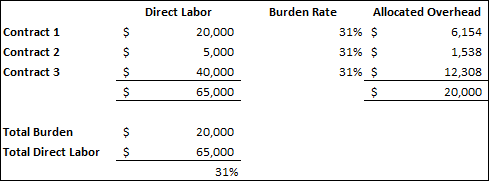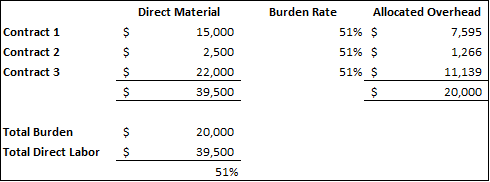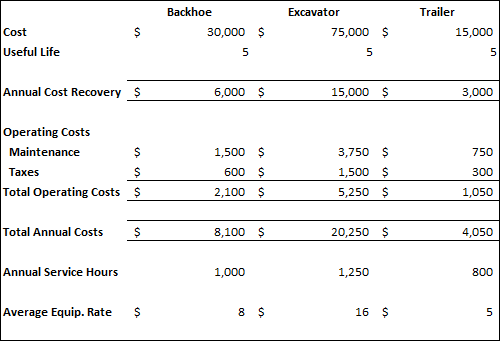Clarke Beller and Ryan Cook

A new project manager at your construction company is consistently seeing margins deteriorate at the end of their construction projects. The key question when confronting this situation is to determine if project management and accounting know and understand their costs. Knowing your costs can improve the bidding process and help you determine problem projects and employees.
Direct Costs
Construction costs that are specifically allocable to construction contracts are typically referred to as direct costs. Common direct costs are often made up of materials, direct labor, and subcontractor costs. There is little ambiguity with these costs, and they are typically easy to apply or assign to a specific construction contract.
Indirect Costs
In contrast, construction costs that are not specifically allocable to construction contracts are typically referred to as indirect costs. The three most common types of indirect costs include:
- Overhead – Job site costs, home office costs, and general conditions
- Project Managers, Superintendents, and other Support Staff
- Office Trailers, Equipment, and Supplies
- Insurance, Office Salaries, and other Miscellaneous Costs
- Equipment – Owned equipment and small tools
- Depreciation
- Repairs and Maintenance
- Taxes and Insurance
- Labor Burden
- FICA Taxes
- Workers Compensation
- Federal and State Unemployment
- Vacation and Other Fringe Benefits
Common Methods to Allocate Indirect Costs
Below are a few examples of popular methods used to allocate indirect costs.
Allocate indirect costs based on direct labor:
Allocate indirect costs based on material costs:
Allocate indirect equipment costs based on equipment hours:
Common Pitfalls While Allocating Indirect Costs
However, when allocating indirect costs, be aware of the common mistakes people often make. A few of these common pitfalls include:
- Not considering indirect costs in your bidding process.
- Not allocating indirect costs on a timely basis (i.e., annually instead of monthly).
Maintaining timely records and being sure to include all costs during the entire project will help you avoid any potential errors.
Keeping track of your construction project costs can be tricky and time-consuming. Being able to understand the difference between the two different types of costs will not only help you improve your margins but will give you a better estimate of your project spend. By leveraging your accounting system—and partnering with a team like Lutz—you can streamline and even automate parts of this process, saving valuable time and reducing manual errors. If you have any questions or would like more information on this topic, please contact us today.

- Analytical, Significance, Individualization, Responsibility, Context
Clarke Beller
Clarke Beller, Audit Shareholder, began his career in 2010. With a background in financial analysis, he has developed a strong foundation in financial reporting and business operations. Clarke serves as the construction niche lead, demonstrating his expertise and leadership in this sector.
Specializing in audit and consulting services for privately held companies, Clarke focuses primarily on the construction industry. He oversees audits, reviews, and compilations while offering business consulting on a monthly, quarterly, and annual basis. Clarke values Lutz's customer-first approach, which allows him to apply his analytical skills and industry knowledge to help clients succeed.
At Lutz, Clarke embodies the firm's "say it straight" philosophy, offering honest and candid insights to clients. His ability to dissect complex financial data and present clear, actionable recommendations ensures clients receive transparent, reliable guidance.
Clarke lives in Omaha, NE, with his wife Kayla and their two sons, Brock and Brant. Outside the office, he spends time golfing, boating, and following football.

- Command, Woo, Competition, Self-Assurance, Ideation
Ryan Cook
Ryan Cook, Audit & Consulting Shareholder, began his career at Lutz in 2006 as an intern. His professional trajectory exemplifies the firm's commitment to developing talent from within. Named one of Midlands Business Journal's 40 Under 40 in 2017 and becoming a shareholder at age 30, Ryan's leadership potential was recognized early. He currently serves on the board of directors and leadership committee and will assume the role of Managing Shareholder in 2025, marking the next chapter in Lutz's leadership.
Leveraging his expertise in audit and valuation services, Ryan serves clients across the construction, real estate, and transportation industries. He provides comprehensive consulting solutions while managing strategic firm initiatives. Ryan values building lasting relationships with clients while fostering the next generation of talent, ensuring both clients and employees achieve their full potential.
At Lutz, Ryan embodies the firm's dedication to embracing change through his dynamic and visionary leadership. His entrepreneurial spirit and ability to connect with stakeholders of all generations position the firm for continued growth and innovation. As he prepares to become Managing Shareholder, Ryan remains focused on advancing Lutz's strategic vision.
Ryan lives in Elkhorn, NE, with his wife Katie and their children Keegan, Collins, and Griffin. Outside the office, he can be found watching his kids' activities and playing golf.
Recent News & Insights
Do You Need a Family Office? 7 Aspects to Consider
Tariff Volatility + 4.7.25
Lutz Named Top Consulting Firm in 2025 Omaha B2B Awards
Direct vs. Indirect Costs in the Construction Industry




%20(1)-Mar-08-2024-09-22-41-1011-PM.jpg?width=300&height=175&name=Untitled%20design%20(5)%20(1)-Mar-08-2024-09-22-41-1011-PM.jpg)
%20(1)-Mar-08-2024-09-27-14-7268-PM.jpg?width=300&height=175&name=Untitled%20design%20(6)%20(1)-Mar-08-2024-09-27-14-7268-PM.jpg)

%20(1)-Mar-08-2024-09-11-30-0067-PM.jpg?width=300&height=175&name=Untitled%20design%20(3)%20(1)-Mar-08-2024-09-11-30-0067-PM.jpg)
%20(1)-Mar-08-2024-09-18-53-4361-PM.jpg?width=300&height=175&name=Untitled%20design%20(4)%20(1)-Mar-08-2024-09-18-53-4361-PM.jpg)
-Mar-08-2024-09-03-21-1119-PM.jpg?width=300&height=175&name=Untitled%20design%20(1)-Mar-08-2024-09-03-21-1119-PM.jpg)
-2.png?width=264&height=160&name=Website%20Featured%20Content%20Images%20(1)-2.png)
-Mar-08-2024-08-50-35-9527-PM.png?width=300&height=175&name=Untitled%20design%20(1)-Mar-08-2024-08-50-35-9527-PM.png)


.jpg)







